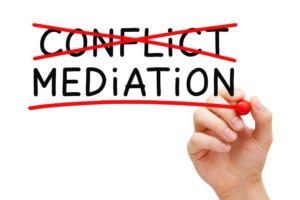Mediation
Alternative dispute resolution can save financial and emotional costs. Not only is litigation expensive and time-consuming, but it can be very stressful. You may feel that an important part of your life is on hold while you are waiting for a trial date, wondering and worrying about the outcome. If you have to deal with each other in the future, using an adversary process like litigation risks polarizing and embittering your relationship. The emotional wounds…
Read This Article >>It is becoming very common for our clients to ask about alternative dispute resolution (ADR). In fact, in many judicial districts in North Carolina, the district court has adopted rules for mandated ADR in family law cases. The goal of the Administrative Office of the Courts is to have statewide mandatory custody mediation and mandatory ADR for the resolution of financial issues related to separation and divorce. Even after you file a lawsuit, statistics show…
Read This Article >>Mediators can increase the likelihood of a negotiated settlement by bringing the skills, creativity, and influence of trained, impartial third parties to bear on the problem. Perhaps more importantly, frequently mediation can save time and money. Mediation keeps your options open, and reduces issues of conflict. Although most people who begin mediation have a successful conclusion, some do not. If mediation doesn’t work, you can still sue, and go to court or engage in arbitration.…
Read This Article >>Mediation is a process in which two or more people involved in a dispute come together voluntarily to try to develop a solution to their problem with the help of a neutral third person (or persons), called the mediator. Unlike a judge or an arbitrator, the mediator does not take sides or make decisions. The mediator, usually trained in conflict resolution, is there to help the disputants evaluate their goals and options in order to…
Read This Article >>WHAT IS MEDIATION? Mediation is a process in which two or more people involved in a dispute come together voluntarily to try to develop a solution to their problem with the help of a neutral third person (or persons), called the mediator. Unlike a judge or an arbitrator, the mediator does not take sides, or make decisions. The mediator, usually trained in conflict resolution, is there to help the disputants evaluate their goals and options…
Read This Article >>






